#Neurological Expertise
Explore tagged Tumblr posts
Text
Scoliosis treatment without surgery using exercise | Neurosurgeon in Delhi

Scoliosis can cause trouble if not treated correctly. Many doctors and top neurosurgeon have suggested exercises to help patients deal with pain and correct the spine posture during daily activities. Scoliosis exercises should be done cautiously and with good technique. The objective is to establish spine symmetry to restore trunk alignment and relieve back discomfort.
This guide curated by the Dr. Nagesh Chandra, Neurosurgery Specialist in Dwarka, Delhi, explains the meaning of scoliosis, exercises, etc. You must consult your doctors before performing any exercise to ensure it is safe for your condition. Follow all the instructions from your doctor and take a path towards fitness.
What is Scoliosis and its diagnosis in Delhi?
Scoliosis is a sideways spine curve that can look like an “S” or “C” shape. It can cause the body to tilt to the side, and some people may have one shoulder higher than the other. Scoliosis is usually mild and does not cause symptoms but can lead to back pain. Most cases of scoliosis are mild, but some curves worsen. Scoliosis is more likely to get worse while bones are still growing.
Scoliosis occurs in about 3% of people and most commonly develops between the ages of ten and twenty. Females typically are more severely affected than males, with a ratio of 4:1.
Scoliosis and Kyphosis however looks similar but are two different spine conditions.
Scoliosis treatment without surgery using exercises
These are some of the exercises for scoliosis that must be performed under an Spine doctor supervision.
Cat-camel

The cat-camel stretch is a freehand exercise that can help improve the flexibility and mobility of the spine. It can also help prevent spinal disorders and reduce pain.
How to perform it: You must lie down and stand on your hands and legs. Ensure your back is on level and your head & neck are comfortable. Arch your back and inhale deeply while drawing your abdominal muscles up & down. Now, exhale, relieve your abdominal muscles, and drop your neck. Lay flat on your belly and lift your towards, facing towards the ceiling.
Latissimus dorsi stretch
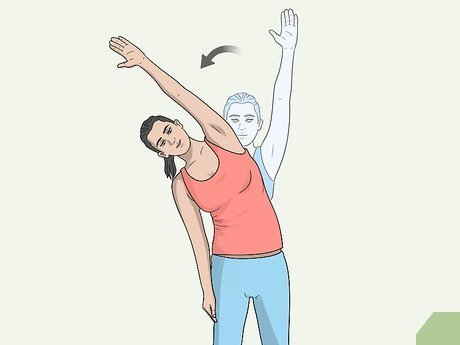
How to perform it: Stand and keep your back straight. Keep your legs apart and slightly bend your knees. Raise your hands and hold the right wrist with your left hand. Bend towards the right side until you feel a stretch in your body. Hold your breath for 10-15 seconds, and release your breath and hands. Repeat the same process on the left side.
Abdominal press
The abdominal press is a static exercise that can help with scoliosis by strengthening the core and abdominal muscles. Read more
#Scoliosis treatment#Spine specialist in Dwarka#Neurosurgeon in Delhi#Neurological Expertise#best neurosurgeon in delhi
0 notes
Text
Title: Dr. Vinay K Gurumath: Expert Neurosurgeon in Dubai for Advanced Brain and Spine Care
Dr. Vinay K Gurumath is a renowned neurosurgeon in Dubai, specializing in cutting-edge treatments for brain and spine conditions. With expertise in advanced surgical techniques and personalized patient care, he is dedicated to delivering exceptional outcomes for complex neurological disorders.
#Dr. Vinay K Gurumath is a renowned neurosurgeon in Dubai#specializing in cutting-edge treatments for brain and spine conditions. With expertise in advanced surgical techniques and personalized pat#he is dedicated to delivering exceptional outcomes for complex neurological disorders.
2 notes
·
View notes
Text
Unlocking Hope: Journeying Through Stroke Treatment with the Best Neurologists
In the intricate dance of life, unforeseen challenges can sometimes take center stage. Among these challenges, stroke stands as a formidable adversary, capable of disrupting the very essence of our being in the blink of an eye. However, in the midst of adversity, hope shines brightly through advancements in medical science and the expertise of dedicated professionals. Today, we delve into the realm of stroke treatment, guided by the hands of the best neurologists, as we embark on a journey toward recovery and renewal.
Understanding the Stroke Spectrum with Dr. Mukesh Kumar, the Best Neurologist for Stroke Treatment
Stroke, often described as a "brain attack," arises when the delicate balance of blood flow to the brain is disturbed, leading to a cascade of events that can result in lasting damage. There are different types of strokes, each with its own unique characteristics and treatment approaches.
- Ischemic Stroke: The most prevalent form of stroke, ischemic stroke occurs when a blood vessel supplying the brain becomes obstructed, depriving it of vital oxygen and nutrients. Clots or debris in the bloodstream can trigger this blockage, emphasizing the importance of timely intervention to dissolve or remove the clot.
- Hemorrhagic Stroke: In contrast, hemorrhagic stroke unfolds when a blood vessel ruptures within the brain, causing bleeding and potential damage to surrounding tissues. Factors such as high blood pressure or aneurysms can precipitate this critical event, underscoring the need for vigilant monitoring and management.
- Transient Ischemic Attack (TIA): Often referred to as a "ministroke," a TIA serves as a warning sign of potential impending stroke, necessitating urgent evaluation and preventive measures. Though transient in nature, TIAs signal an underlying vascular issue that demands attention to avert future complications.

*Recognizing the Signs*
In the realm of stroke, time is of the essence. Swift recognition of warning signs can pave the way for timely intervention and improved outcomes. Symptoms such as slurred speech, facial drooping, sudden vision changes, severe headaches, and difficulty walking demand immediate attention, serving as beacons guiding individuals toward the path of treatment and recovery.
*Embracing the Power of Treatment*
Amidst the storm of uncertainty, the beacon of hope shines brightly through advancements in stroke treatment. From the administration of clot-busting medications within the critical window to innovative mechanical thrombectomy procedures, the arsenal against stroke continues to expand, offering renewed hope to those in need.
*Championing Rehabilitation*
Beyond the realm of acute care, stroke rehabilitation emerges as a cornerstone of recovery, offering a lifeline to individuals navigating the path toward restoration. Physiotherapy, occupational therapy, speech therapy, and a host of other modalities work in harmony to rebuild strength, restore function, and ignite the flames of resilience within each individual.
*The Role of the Best Neurologists*
At the heart of every successful stroke journey lies the guiding hand of a skilled neurologist. Armed with expertise, compassion, and unwavering dedication, these professionals serve as beacons of hope, guiding patients and their families through the turbulent waters of stroke treatment with grace and expertise.
Choosing the Right Path with Dr. Mukesh Kumar, the Best Neurologist for Stroke Treatment
In the quest for optimal stroke treatment, the importance of choosing the right neurologist cannot be overstated. With a wealth of experience, a commitment to excellence, and a compassionate approach, the best neurologists stand ready to accompany individuals on their journey toward recovery, offering expertise, support, and unwavering encouragement every step of the way.
*In Conclusion*
As we navigate the complexities of life, stroke may emerge as an unexpected adversary, challenging our resilience and resolve. Yet, in the face of adversity, hope prevails, fueled by the unwavering dedication of the best neurologists and the transformative power of cutting-edge treatments. Together, let us embrace the journey toward healing, guided by the hands of those who champion the cause of hope and renewal.
With over 20 years of experience in managing various brain disorders, Dr. Mukesh Kumar stands out as the *Best Neurologist for Stroke Treatment*. His work speaks volumes about his efficiency and expertise, and his treatments stand as testaments to his dedication to providing the highest quality care to his patients.
#StrokeAwareness#Neurology#StrokeTreatment#BestNeurologist#BrainHealth#MedicalAdvancements#Rehabilitation#Healthcare#IschemicStroke#HemorrhagicStroke#TransientIschemicAttack#Physiotherapy#OccupationalTherapy#SpeechTherapy#HopeAndHealing#MedicalScience#Expertise#Compassion#DrMukeshKumar#MedicalCare#HealthcareProfessional
0 notes
Text
the fandom infantilization of Siffrin upsets me. like yall thats a whole ass adult!!!! he lived on his own for like 10 years!!!! without a home or a community to call their own they survived and did well enough that their first meeting with the party was SAVING THEM from a Sadness!!! the entire party's impression of him was on a scale between "extremely suspicious stranger" and "cool and mysterious"!!!! their reaction in the first loop to odile bringing up the super potion incident was to bat their eyes cutely!!!! they start the touch therapy thing in the garden room on their own initiative becasue they're aware of their own mental health needs!!!! Siffrin is a chaotic gremlin ADULT who manages his own shit perfectly fine until he's put in a situation tailored to target his personal weaknesses with laser precision!!!!
like... yall. Siffrin looks after people around him. Siffrin has strong opinions on taking care of children. Siffrin is second oldest in the party after Odile and shares a unique understanding with her.
Siffrin. Is. An adult. An asexual, nonbinary, short adult who's managed to remain functional and autonomous despite serious neurological problems without any support network. The rest of the party thinks he's cool because he is. They have strong moralðical principles that they act on, rather than just personal duckling imprinting loyalty ("I love you personally because you're mine" comes up nowhere in his speech to Bonnie about why he would protect them at the cost of mutilation again - it's purely about Bonnie being a kid and adults having an obligation to protect them)
Like... there's this perfect storm of Siffrin being - explicitly asexual, implied on the aromantic spectrum, - mentally ill with brain damage (the memory shit) and also physically disabled (the eye), - nonbinary, - short and thin, - quiet with cutesy mannerisms, - specifically needing care and affirmations at the end of the story, that combines to people lumping them into the "cute baby to be taken care of" category, consciously or subconsciously to various degrees
but like
no it's actually pretty important that Siffrin is an adult who needs those things
mid to late twenties is an adult
mid to late twenties having lived on his own since mid to late teens is VERY MUCH an adult!!!!
give me Siffrin who drinks. give me Siffrin who gambles. give me Siffrin who used to engage in a variety of high risk hobbies/games/activities that they've scaled back on since joining because they identified Mirabelle and Isabeau as impressionable youngsters to be kept safe from bad ideas. give me Siffrin who is competent at a wide variety of random odd jobs because that's how they used to make a living. give me Siffrin who has a wide pool of mostly but not exclusively shallow medical knowledge and an unsettlingly deep expertise in first aid because he's had to take care of himself for a decade (and who picks up Healing Craft quickly&effectively compared to the years people usually need to study it due to this 'field experience'). give me Siffrin with multiple failed relationships in their past, some of which ended amicably due to the natural process of self-discovery and drifting apart, some of which ended because the other person was an asshole, and some of which ended because Siffrin himself was an inconsiderate jerk. give me Siffrin who used to be a much more unpleasant person, including on purpose, when they were younger. give me Siffrin who can in fact be trusted with sharp objects post-canon but avoids some of them of their own volition now because they're aware of self-harm urges being a bad thing to be avoided and are capable of managing that for themselves when outside of an active ongoing mental breakdown!!!
give me Siffrin who is better at flirting than Isa is!!! give me Siffrin who can talk Mirabelle through her hangups and anxiety attacks!!! give me Siffrin who engages with Odile as a peer when the rest of the party sees her a an elder!!!! give me Siffrin who is good with children from the position of an adult who has the patience and empathy to indulge them!!! ALL OF THESE IN THIS PARAGRAPH ARE LITERALLY CANON FACTS ABOUT SIFFRIN!!!!!
sickfic about Siffrin is great!!! give me sickfic where at one point everyone else falls apart from fear and pressure and Siffrin, all while still having a fever and stumbling while walking, steps up and picks up the slack!!!
give me a fic where Siffrin helps Odile deal with the unsettling experience of her new research topic having antimemetic properties by sharing his own tricks for dealing with memory loss!!!
give me a fic where Siffrin keeps having to scale back their flirting with Isabeau because they keep stumbling on Isa being unable to articulate or even realize his boundaries and have to make a project of walking Isa through basics of healthy relationships!!!!
give me a fic where Siffrin teaches Mirabelle about the wider world outside Dormont and outside her sheltered bubble as a Housemaiden!!!
give me a fic where Bonnie increasingly relies on Siffrin as an adult to come to with problems, and Siffrin keeps having to develop new skills and areas of knowledge to effectively help!!!!
give me a fic where the party has no idea how to help Siffrin with a problem because Odile has never had a problem quite like this in her life and the rest of them just feel completely lost in the face of experience they have never had!!!!
GIVE. ME. SIFFRIN. THE. ADULT.
(also, on a tangentially related personal preference aesthetic note, give me Siffrin with scars. give me Siffrin who overdid Healing Craft in the last loop so bad Mirabelle couldn't heal them cleanly and who is happy to have reminders that these events really happened and are over now and he's still in the same timeline. give me Siffrin with top surgery scars deliberately kept as an aesthetic affectation. give me Siffrin whose face did not heal cleanly from the loss of an eye. give me Siffrin whose body reflects their history and experiences)
884 notes
·
View notes
Note
I have actually read your sources, none of which touch on the neurobiology of "plurality." However, several neurobiology studies have demonstrated that DID is only a result of trauma. As for the link with messages from Colin Ross, I do not see him as a credible source. I am well aware of his history with DID research, but unfortunately, his belief that he can shoot energy beams out of his eyes and his malpractice lawsuits makes him less than credible.
Reinders research group demonstrates that DID cannot be simulated (across various studies) as people claiming plurality are doing. I would recommend looking beyond simplistic literature and actually understand the real science behind trauma disorders. It makes it very clear that DID and being "multiple" is solely caused by trauma. Now given that "plurality" is a relatively new social contagion, alongside the destruction of research institutes within the US, i doubt any research directly comparing the neurology of people claiming to be "plural" and people with DID will come about.
I highly recommend expanding your "research" into more scientifically rigorous papers. Also the DSM does specify that DID is a trauma disorder, you just have not read the whole section, unless you ignored the part where it mentions that 90% of cases are from child abuse and 10% are from war, terrorism, or child prostitution.
You do realize that the lawsuits hinged around allegations that Colin Ross gave the patient "false memory syndrome," a syndrome made up by a group of accused child molesters to defend other accused child molesters, right?
30 years later, we still have little to no evidence that the syndrome ever existed. There are some studies that have shown some minor false memories can be implanted. But data is conflicting and nothing on the level of the severe persistent traumatic experiences that have been alleged have been validated. The foundation that created this made up syndrome has since closed down.
If you want to talk about pseudoscience, then you should probably talk about the pseudoscience that drove a lot of the malpractice lawsuits against specialists of dissociative identity disorder at the time.
As for Ross's belief that the human eye can emit energy, I genuinely don't see how that is relevant. Plenty of experts in various fields hold some sort of metaphysical beliefs. Especially when those beliefs are outside of their area of expertise. And Ross is primarily a psychiatrist, not a physicist or a biologist.
The fact is that Colin Ross is one of the foremost experts on dissociative identity disorder in the world. He is a doctor who has spent over 40 years working directly with patients with DID. He has written more books on the topic than almost anyone alive. If not more than anyone alive. His contributions to the field are still regularly cited by other reputable doctors because he is considered a credible source by actual academics.
He has spent his entire career fighting for trauma survivors. Working with patients, developing new treatments, and encouraging trauma-centered care.
You would struggle to find doctors with more experience than Colin Ross with treating dissociative identity disorder.
But I get what you are doing. You can't win on the front of expertise and experience. So you go for personal attacks. When faced with the reality that one of the most experienced expert on DID doesn't support your hate, you decide it's better to find anything you can in his history of fighting for trauma survivors to discredit him.
You cannot accept that the experts disagree with you. That you can't actually find ANY experts who support your belief that plurality can only come from trauma. So your only viable move is trying to attack the experts.
Reinders research group demonstrates that DID cannot be simulated (across various studies) as people claiming plurality are doing.
If these studies are the ones I think they are, what they show is that DID is distinct from "simulating controls." That is, a control group of neurotypical singlets that simply pretends to have DID. What they show is that "people pretending to have an alter will appear differently on a brain scan than people with DID."
It's really not relevant for a number of reasons, and frankly is built on a lot of circular reasoning. Since these studies literally only compare the DID group to roleplayers, you sort of have to start with the premise that endogenic systems are roleplaying to think this is relevant at all.
"Endos are roleplaying" -> "Studies comparing DID systems to roleplayers show that DID is different from roleplaying" -> "This proves that endogenic systems aren't real" -> "Therefore endos are roleplaying."
Citing studies comparing the brains of DID systems to neurotypical singlets who pretend to have DID as evidence that endogenic systems aren't real makes no sense!
I highly recommend expanding your "research" into more scientifically rigorous papers. Also the DSM does specify that DID is a trauma disorder, you just have not read the whole section, unless you ignored the part where it mentions that 90% of cases are from child abuse and 10% are from war, terrorism, or child prostitution.
How are you guys all failing this much at basic reading comprehension that you imagine words that aren't there? This talking point comes up all the time and it is always just wrong.
Here is the quote you're referring to!
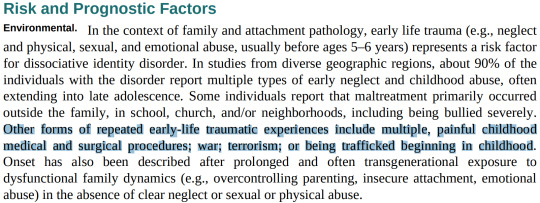
Read it over closely a few times.
Note that it does not mention that this makes up the other 10% of cases, only that they have also been reported. Let's break this paragraph down.
Early life trauma represents an environmental risk factor for DID.
About 90% of cases report neglect or abuse.
The early life traumatic experiences can also include painful childhood medical procedures, war, terrorism and human trafficking.
Onset of the disorder has also been described after exposure to other dysfunctional family dynamics.
Going by this alone, these cases could make up the other 10%... or only 5% or 2%.
90% of cases show reports of abuse or neglect. And then an unspecified number of cases report other forms of traumatic experiences.
I am not saying that DID can for certain form without any trauma at all. I am just saying that if you think that this paragraph proves 100% of DID cases are traumagenic, you have fundamentally failed at reading.
#syscourse#pro endogenic#pro endo#systempunk#psychology#psychiatry#multiplicity#sysblr#actually plural#actually a system
23 notes
·
View notes
Text
MARRIED MAN

And once your secrets are out in the open, you don't have to hide behind them anymore.
"Long day?" Seattle Grace Hospital's newest head of neurology, Dr. Derek Shepherd, glanced up from the mountain of papers and his glowing laptop screen as a figure approached. The harsh fluorescent lights reflected off her tired eyes, her posture rigid under the weight of exhaustion.
"Yeah," came the curt reply from Meredith Grey, a first-year surgical intern. She clutched her bag and jacket, her knuckles white from the strain, her gaze barely meeting his.
Derek began packing away his work, sliding his papers into a sleek leather bag with practiced ease. "Somewhere out there, there's a steak with your name on it," he said, his tone warm, "and maybe a bottle of wine."
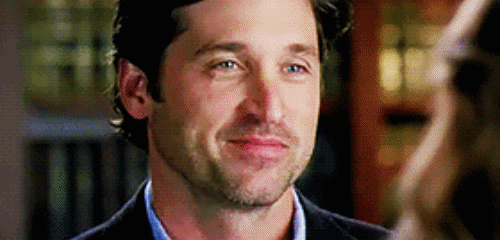
"This is why I keep you around," Meredith said with a weary but genuine smile, the faintest trace of humor in her voice.
As Derek zipped his bag shut, his expression grew serious. "We need to talk."
"Wine first, talk later," Meredith quipped, brushing off the tension in his voice. Her body seemed to sag with relief at the thought of escaping the hospital's sterile walls, eager to exchange her clothes for pyjamas.
Derek chuckled lightly, attempting to lighten the mood. "You trying to, uh, get me drunk so you can take advantage of me?" he teased, his words laced with a playful reminder of their first encounter.
"I think I like this rules thing," Meredith replied, her chuckle matching his.
"Me too." Derek shrugged into his coat, finishing first, and reached over to help Meredith adjust hers. His fingers brushed against hers for a fleeting moment, and they turned to leave together, their step in sync.
Neither noticed the figure watching them from across the waiting area, her sharp eyes locking onto Derek like a predator eyeing its prey.
As they approached the door, Derek's casual expression froze, his gaze snagging on the woman who now stood in their path. Her fiery red hair cascaded over her shoulders, perfectly styled despite the late hour. A smirk curved her crimson lips, dripping with unspoken malice.
Derek's breath hitched as fear flashed across his face. "Meredith, I am so sorry," he muttered, the words tumbling out as he turned to her.
Meredith's brow furrowed in confusion, but before she could ask, the redheaded woman closed the gap between them, her heels clicking with precision against the polished floor.
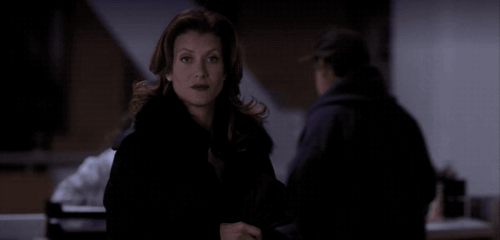
"Addison," Derek said, his voice low and tense as if speaking her name aloud might summon more trouble.
The problem with secrets is that even when you think you're in control...
"What are you doing here?" Derek's voice stayed strong, trying not to betray the carefully composed mask he so often wore.
"Well, you'd know if you'd bothered to return any one of my phone calls," the woman replied smoothly. Her tone was sweet venom, her words striking with practiced ease.
"Hi, I'm Addison Montgomery," she announced, extending a manicured hand toward Meredith, her smirk never wavering. Her presence radiated authority, each syllable underscoring her status as a world-class neonatal surgeon with expertise in obstetrics, gynecology, and maternal-fetal medicine.
"Meredith Grey," the blonde said cautiously, hesitating before taking Addison's hand. A sharp breath escaped her lips, one she hadn't realized she'd been holding. Relief coursed through her—this wasn't the confrontation she feared. At least she wouldn't be labeled a homewrecker.
Or so she thought.
"And you must be the woman who's been screwing my best friend...who's married."
The air thickened, suffocating in its silence.
...you're not.
At Addison's last words, Meredith's face crumpled. The weight of humiliation and heartbreak crashed over her like a tidal wave. Without another word, she spun on her heel and bolted, her breaths shallow and panicked. The walls of Seattle Grace felt like they were closing in, suffocating her. She stumbled out into the cool night air, her tears blurring the glow of the streetlights as she made her way to the Emerald City Bar across the street.
The bar's dim lighting and warm, smoky ambiance welcomed her like an old friend. Sliding onto a stool, she ordered the strongest drink on the menu, desperate to drown her sorrows in alcohol and forget the words that had just shattered her world.
Meanwhile, back at Seattle Grace, the tension between old friends simmered just below boiling point.
"Addison, what are you doing here?" Derek demanded, his voice low but tight, his jaw clenching as he stared at the redhead who had once been his closest confidante.
Addison tilted her head slightly, her sharp gaze studying him like a puzzle she'd long since solved. "Your hair's different," she remarked casually, as though the weight of their conversation wasn't crushing the air around them.
"A lot of things are different," Derek replied, his tone cold and clipped.
Addison's lips curved into a wry smile. "It's longer. I like it. Very Russell Crowe," she teased, reaching out to touch his hair. Derek pulled back, his eyes narrowing in irritation, his instincts screaming that her presence here wasn't out of concern but vengeance.
"What are you doing here?" he asked again, his patience thinning.
Addison folded her arms, leaning into the confrontation. "What are you doing here?" she shot back, her voice sharp and accusing. "You just picked up and left everything—your house, your practice, your friends. You had a life in Manhattan."
"Had," Derek corrected firmly, his tone daring her to challenge him further.
Addison's expression darkened, her voice hardening as she delivered her next blow. "More specifically, your family. You know, your wife and two daughters who miss their father." Her words hung in the air like a dagger poised to strike. Her glare was as cutting as her tone, her disbelief palpable. "You, of all people, Derek—whose life revolved around his wife and kids—just up and left like it was nothing. You left her—the love of your life—to pick up the pieces of a broken home you've created. And now you're here in Seattle, flaunting a girlfriend? She seems sweet."
Derek's hands curled into fists at his sides. His voice dropped to a growl, barely contained. "The ice you're on? Thin."
Addison didn't flinch. Her smirk only deepened. "No," she countered coolly, "the ice you're on is thin." She stepped forward, closing the gap between them as Derek tried to turn away.
"I did nothing wrong—she did!" Derek spat, his voice rising.
Addison could have corrected him, thrown the truth in his face right then and there. She could have revealed who had truly shattered their world, but a darker part of her relished the thought of him figuring it out on his own. The dumbfounded look on his face would be worth the wait.
"If you came here to drag me back to New York, save your breath," Derek snapped. "Forget it. I'm not going back."
Addison shook her head, her eyes narrowing with contempt. "I did fly across the country, Derek. But not to beg you to go back. You should already know that's where you belong—with your family, with your kids. But no, I'm here for work. I'm consulting on the TTTS case you admitted last week. Richard asked me to come."
"Richard?" Derek's face hardened further. "He knew you were coming?"
"Of course," Addison said, raising a brow as if Derek's surprise amused her. "Didn't he tell you?"
"No. He didn't."
Addison shrugged, her expression indifferent. "Hmm. Surprise." She let her eyes linger on him for a moment, her smirk turning sly. "By the way, I've always had a thing for Russell Crowe. The hair suits you." She turned as though to leave but paused, glancing back over her shoulder with a glint of malice. "Oh, and that thin ice you're on? Prepare for it to collapse in twelve hours. She's in town. And trust me—she's ready to wreak havoc."
With that, Addison sauntered off, her heels clicking against the polished floor, leaving Derek standing alone, his world teetering on the brink of disaster.

#wattpad#black writers#fanfic#black oc#black tumblr#my writing#derekshepherdsmut#derekshepherdimagine#derek shepherd#meredith grey imagine#meredith grey x reader#greys anatomy#george omalley#x black fem reader#x black reader#x black oc#x black y/n#cristina yang#alex karev#polyamory#izzie stevens#miranda bailey
32 notes
·
View notes
Text
Taking Back Control ❀ Toge Inumaki Masterlist HFBU
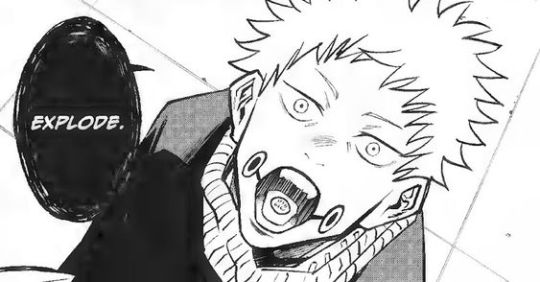

The idea is risky. Cursed speech is powerful, but it's not something to be used lightly, especially not on something as complex and delicate as the human brain. But the thought of having a way to stop a seizure in its tracks is too tantalizing to ignore.
Now, as you sit in the living room, the atmosphere is a mix of anxiety and anticipation. Shoko sits beside you, her medical expertise offering a sense of safety and reassurance. Gojo lounges on the opposite couch, his usual carefree demeanor somewhat tempered by the seriousness of the situation.
“Are you absolutely sure about this?” Shoko asks. “There’s a lot we don’t know about how cursed energy interacts with neurological conditions.”
You nod, feeling the weight of your decision. “I know it’s risky, but if it works… it could change everything.”
Toge reaches out and takes your hand, his touch warm and reassuring. He’s wearing his usual high-collared jacket, which he nervously adjusts with his free hand.
Gojo leans forward, his usually hidden eyes visible through his lowered sunglasses. “Alright, here’s the plan. Shoko will monitor your vitals closely. Toge, you’ll be on standby. If a seizure starts, you’ll use your cursed speech to try and stop it. If it seems like things are going wrong, we'll figure it out"
Shoko sets up the equipment to monitor your brain activity and vital signs, her movements precise and efficient. “Ready?” she asks, looking at you with a reassuring smile.
You take a deep breath and nod. Toge squeezes your hand gently, and you feel a surge of determination. You’re ready for this. You have to be.
As the minutes tick by, you try to stay calm, focusing on your breathing and the warmth of Toge’s hand. The room is quiet, everyone waiting in a tense silence. Then, it happens. You feel the familiar, terrifying aura of an impending seizure—a sense of unreality, a detachment from your own body.
“Toge,” you manage to whisper, your voice trembling.
His eyes lock onto yours, filled with a mixture of fear and resolve. He takes a deep breath, focusing his cursed energy. “Stop,” he commands, his voice firm and clear.
The effect is immediate. You feel a strange sensation, as if something invisible has wrapped around your mind, holding it steady. The aura recedes, the seizure stopping before it can fully take hold. Your body, which had started to tense, relaxes. The room is silent except for the steady beeping of the machines.
Shoko leans in, checking the readouts with wide eyes. “It… it worked. Your brain activity is stabilizing.”
Gojo lets out a low whistle. “Well, I’ll be damned. Looks like we might be onto something here.”
Toge pulls you into a gentle hug. “Tuna mayo,” he says softly, his way of expressing his feelings when words fail him.

The next few days pass in a blur of cautious optimism and careful observation. Under Shoko's vigilant eye, you and Toge repeat the experiment several times, each trial bringing a mixture of anxiety and hope.
Each time, Toge’s cursed speech successfully halts the seizures. The results are consistent, and with every successful attempt, the initial trepidation starts to give way to a budding sense of triumph.
One afternoon, as you sit in the medical wing with Shoko, she goes over the data collected from the trials. “Your brain activity shows significant improvement during and after Inumaki's intervention,” she says, her tone a mixture of amazement and caution. “But we need to keep in mind that this is still very experimental. There’s a lot we don’t understand about how cursed energy interacts with the brain.”
You nod, understanding the gravity of her words. “I get it. But it’s a start. A really good start.”
Shoko smiles, placing a hand on your shoulder. “It is. And I’ll be here to make sure you’re safe every step of the way.”
Later, you and Toge take a walk through the school grounds, the evening air cool and refreshing. The sun sets in a blaze of orange and pink, casting long shadows across the lawn. Toge’s hand is warm in yours, a comforting presence as you navigate this new chapter together.
“Toge,” you say, breaking the comfortable silence. “Thank you. I know this hasn’t been easy for you either.”
He stops walking and turns to face you, his eyes serious. “Mustard leaf,” he says softly, his way of conveying that he’s doing this for you, because you mean the world to him.
You smile, squeezing his hand. “I know. And I appreciate it more than you can imagine.”

Months continue to fly by, and the routine you and Toge establish becomes a new normal. Shoko remains ever-vigilant, her careful monitoring ensuring that you stay safe.
Gojo, in his own way, continues to offer support, though his methods are often unconventional. He even suggests training sessions to help you and Toge better synchronize your efforts, making sure you’re prepared for any situation.
One afternoon, during a particularly intense training session with Gojo, you feel the familiar aura of an impending seizure. Without missing a beat, Toge steps forward, his eyes locking onto yours.
“Stop,” he commands, his voice steady and filled with authority.
The seizure halts almost immediately, the sensation dissipating like mist in the morning sun. You take a deep breath, feeling the wave of relief wash over you. A rare warm smile forms on Gojo's face, the man knowing first-hand the toll your condition takes on you, physically, mentally and most of all emotionally.
“Excellent,” Gojo says, his voice uncharacteristically gentle. “You’re getting the hang of this. Both of you.”
You glance at Toge, who is watching you intently, his eyes filled with a mixture of relief and pride. His hand finds yours, giving it a reassuring squeeze. “Salmon,” he says softly, his simple word conveying so much more—his unwavering support, his pride in your strength, and his love.
Gojo claps his hands together, breaking the moment. “Alright, let’s call it a day. You both deserve a break.”
As you walk back to the dormitory, the setting sun casting long shadows across the training grounds, you feel a deep sense of accomplishment. The progress you’ve made with Toge’s help is more than just a physical achievement; it’s a testament to the bond you share.
Later that evening, you find yourself in the common room with Toge, Shoko, and Gojo. Shoko is reviewing the data from your latest session, her brow furrowed in concentration. Gojo, meanwhile, is lounging on the couch, a rare moment of stillness for the usually hyperactive sorcerer.
“You know,” Gojo says, his voice breaking the silence, “this whole thing has got me thinking. Maybe we should document your progress. It could help others in the future.”
Shoko looks up from her notes, nodding thoughtfully. “That’s not a bad idea. The data we’re collecting is invaluable, but personal experiences and observations are just as important.”
You look at Toge, who nods in agreement. “Fish flakes,” he says, indicating his support for the idea.
Over the next few weeks, you and Toge begin documenting your journey, writing down your experiences, your feelings, and the progress you’ve made. It’s a therapeutic process, allowing you to reflect on how far you’ve come and how much you’ve grown.
One evening, as you’re writing in your journal, Toge sits beside you, his presence a comforting constant. He reads over your shoulder, his hand gently resting on your back.
“Do you think this will help others?” you ask, looking up at him.
He nods, his eyes filled with conviction. “Salmon,” he says softly, his way of saying that he believes in the impact of your story.

Months pass, and your routine becomes a new normal. Shoko continues to monitor your condition, while you and Toge grow more adept at managing your seizures with his cursed speech. It’s not a perfect solution, but it gives you a sense of control you haven’t felt in years.
One evening, you find yourself on the dormitory roof with Toge, watching the stars. The night is clear, the sky a canvas of twinkling lights. You lean against him, feeling the steady rise and fall of his breath.
“It’s strange,” you say softly, breaking the comfortable silence. “I’ve spent so long fearing my seizures, feeling like they controlled my life. And now, thanks to you, I feel like I have some control back.”
Toge’s arms tighten around you, his silent way of offering comfort. “Salmon,” he murmurs, his voice a gentle reassurance.
You turn to face him, your heart swelling with gratitude and love. “I don’t know what the future holds, Toge. But I’m not afraid anymore. Not with you by my side.”
His eyes meet yours, filled with a depth of emotion that words can’t capture. “Tuna mayo,” he replies, a promise of his unwavering support and love.
The stars above seem to shine a little brighter, the world feeling a little more hopeful. With Toge by your side, you know you can face whatever challenges come your way.

#jjk x reader#jjk smau#jujutsu kaisen x reader#jujutsu kaisen x you#jjk#jujutsu#jujutsu kaisen#inumaki toge#inumaki toge imagine#toge x reader#inumaki toge x reader#toge#inumaki x reader#jujutsu kaisen inumaki#toge inumaki#jjk inumaki#inumaki smau#gojo satoru#satoru gojo#jjk shoko#shoko ieiri#epilepsy awareness#epilepsy
138 notes
·
View notes
Text
Power Play // Chapter Four // Hockeyplayer!Noah AU
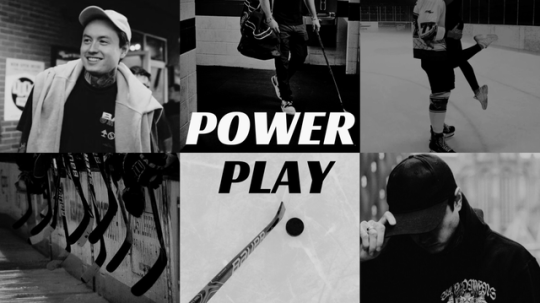
Tropes and tags: RPF:AU hockey player romance, angsty romance, hidden relationship, forbidden relationship, smutty, MF, multiple POV.
Content Warning: angsty romance, hockey player shenanigans, locker room talk, smutty, aggressive hockey players, PinV, MF relationship, possessive male, protective male.
This work below is fictionalized ideas and stories involving real people but does not directly reflect their thoughts, feelings, or behaviors. Please keep in mind that this is a work of fiction.

Active taglist: @ladyveronikawrites @tearfallpixie @beaker1636 @circle-with-me @synthetic-wasp-570 @itsjustemily @thesazzb @vinyardmauro @cookiesupplier @concreteemo @mountains-to-move @sundamariis @caitcoreeeee @crimson-calligraphyx @letmeadoreyoux @starsomens @artificialbreezy @lma1986 @iknownothingpeople @lilrubles @shilohrosechicken @missduffsblog @jessicafg03 @thatchickwiththecamera @mysticdoodlez @chels3a-smile @sinkingteethinwhitenoise @deathblacksmoke @roley-poley-foley @ravieisunhinged @dethronetheveil @to-be-written @somewhere-diamond @somebodyels3 @sacredthefran @cncohshit @flowery-mess @graveatspeople @cncohshit @nerdywitch20 @sundamariis @srorgana1 @malerieee @bloody-delusion-expert @sammyjoeee @deathofpeaceofmiiind @hayleylatour @deadboltsblog @broken0mens
Two days. Forty-eight hours. That's all I get to train before they toss me headfirst into the role of head athletic nurse. Just a couple days shadowing Naomi and then - bam! - she's gone on early maternity leave. And if that's not enough, I can't find a single affordable apartment in this insane city. I was so determined to make it on my own, but after 24 fruitless hours of searching, Dad insisted I take an apartment in the complex where the hockey players live. Move in ready next week, free rent, close to the rink. I should be grateful, right? I mean, it gets me out of Dad's place at least. But now it's game day and I'm nowhere near ready. My head's spinning and my stomach's in knots. I have no idea what I've gotten myself into. This is way too much way too fast. Breathe, girl. Just breathe. You've got this.
My heart pounds as I frantically take stock of my supplies. Tape, ice packs, ace bandages - check. It's not that I don't know how to treat injuries. As a nurse, wounds and fractures are second nature. But this - this is new territory. I didn't sign up for the intensity of trauma care on the sidelines. My expertise is in orthopedics, urology, neurology - slower paced clinic work. Not split second emergency response.
I sit on the sidelines watching warmups, taking in the sights and sounds of the rink. There's a smattering of early bird fans already in the stands, but more are still filing in, arms loaded with popcorn and hot dogs. The boys glide and weave across the ice, firing pucks into the gaping net, muscles coiled as they launch themselves into sharp turns.
McClain and Sanders emerge from the tunnel, bundled in pads and skates. They ease towards the goal, McClain positioning himself between the posts while Sanders hangs back, stick resting casually on his shoulder. The other players start peppering McClain with shots - his glove flashes out, quick as a cat's paw, snagging the pucks from the air. He drops into a butterfly, legs splaying wide to kick away rebounds. I can't take my eyes off him, enthralled by his reflexes and fearless focus.
My stomach is in knots as the warmups wind down. One by one, the players skate over to tap fists with Coach and Jack before heading off the ice. Sanders, Dominick, McClain, Ruffilo - they all make sure to bump fists with me too. I force myself to take some deep breaths as the opening ceremonies begin. I watch anxiously as the puck drops for the first faceoff. The boys look sharp, moving the puck around cleanly, getting some good chances early. My nerves start to settle just a bit seeing them come out strong in these crucial opening minutes. But I'm still on the edge of my seat, ready to jump into action at a moment's notice.
I've got my eyes glued to the ice as the Avalanche roar down the rink with the puck, making a beeline for McClain's net. Sebastian bursts forward, moving in to intercept. Sticks clash and sparks fly as he battles for possession. With a mighty swing, he breaks free and shovels the puck away. But his opponent doesn't take kindly to being shaken off. As Sebastian streaks up the ice, the guy charges after him and slams their bodies together, crushing them both against the boards. The glass shudders from the hit - you can feel the aggression pulsating through the arena.
My eyes are glued to Sebastian as he shakes off that nasty hit. The guy is seeing red, flexing out the arm that just got plastered into the boards. He's back in position now, still fuming, and drives hard to defend the net again. A few more plays and another try for a score but McClain is quick as ever and snags the puck. Sebastian eases up to circle back, but that same goon swoops in and crunches him into the wall again. Suddenly it's mayhem - helmets flying, sticks tossed, bare fists grabbing jerseys, going for faces. The refs dive in to break it all up. My heart's pounding as I take it all in. This game just got heated.
As the whistle blows, Coach bellows for Sebastian to hit the bench and sends in Dominick. My stomach drops. Sebastian's face is as red as his jersey as he skates over, and I shuffle closer, dreading what I'll see. His lip is swollen and split open, a trail of blood oozing down his chin. Coach grabs Sebastian's cheeks and gives him a stern once-over before nodding my way. Our eyes meet briefly before Sebastian clambers over the boards on wobbly skates, weighed down by pads and gear.
My heart races as I rummage through my bag for the gauze and antiseptic. I gently dab the wet gauze on his rugged, battered face, taking care not to hurt him. He winces ever so slightly, pulling back as I tenderly clean the gash on his lip.
"This will need some ice," I murmur, transfixed by his mouth. The wound isn't deep, but it would still hurt if I tried to kiss it. Stop it, Sarah.
"I could just lay on the rink, would that help?" he jokes, flashing me a roguish grin.
I can't help but smile, lost in his sparkling eyes. Even bruised from the game, he makes my stomach do somersaults. As I gently dab the last of the blood from his rugged face, I ask for his hands.
He turns them palm down, rough and shaking. I trace my fingers over the tattoos marking his skin, checking for any hidden injuries. Through my gentle touch, I feel his warmth, his strength. Our eyes meet and my heart flutters. I take his hand in both of mine, lightly pressing each knuckle, thrilled by his closeness. He doesn't flinch. If he's in pain, he doesn't show it. Or maybe it's just the adrenaline.
"Looks good," I say, my eyes lingering a little too long on his handsome face. "Nothing too badly damaged."
He smiles, though it turns into a wince as the wounded side of his lip curves up. "Just my pride," he replies ruefully.
"Ah, pride," I tut, leaning in conspiratorially. "A tricky thing to find once lost. But if I happen to stumble over yours rolling around, I'll be sure to scoop it up and return it to its rightful owner." I give him a playful wink, unable to keep from flirting. Even banged up, he's cute as hell.
NOAH'S POV
As I hop over the boards and back onto the ice, my legs feel a little shaky. I skate slowly back to position, my head still spinning. Man, her smile just melts me every time. So sly and sexy. And that hair... She's such a little fox. I can't stop thinking about her. I've got it bad for this girl. Focus, dude! Gotta keep my head in the game. The way her black and red scrubs hug those round curves of hers. Alright, deep breaths. Back to the action.
I'm back defending our goal after that goon got himself tossed for busting my lip. The blood's dripping down my chin but I've got no time to worry about that. We're up 4-2 with the clock winding down. Karlsson and me, we go together like peanut butter and jelly defending our net. A winger tries to blow past me but I plant him into the boards. I knock the puck loose and pass it off to Karlsson but their center snags it. I shake off the winger clinging to me and slide across the crease to rob the center's shot. I scoop up the puck and send it flying down the ice. I'm throwing hits left and right, keeping their forwards outside our zone. The final horn blares and we've done it again - chalk up another W. My jersey's soaked with sweat but the pain doesn't matter.
I'm beat as we drag our battered bodies back to the locker room. My muscles are screamin' under these pads after the torture session on the ice. That bone-crunchin' check into the boards left my shoulder throbbing with a deep bruise. I grunt and roll my arm, trying to shake out the pain.
The locker room erupts when we stumble in. The boys are hootin' and hollerin', dancing around half-naked and drenched in sweat. I toss my stick and lid in my stall and collapse on the bench, rip off my gloves and gingerly touch my busted lip. The metallic taste of blood fills my mouth as I wince.
I peel off my jersey, wincing as the sweaty fabric sticks to my skin. The pads come next, and I sigh in relief as my shoulders are freed from their restrictive embrace. The locker room falls silent as all eyes turn to me. I run a hand through my damp hair, pushing it back from my forehead.
As I sit on the bench, spent from the game, a shadow falls over me. I glance up to see Little Fox standing there, ice pack in hand, trademark smirk on her lips. She holds out the bag, ice cracking inside, and I take it slowly, letting my fingers brush hers. Her eyes trace over my bare chest and I see her throat tighten as she swallows hard. She wants me. My teammates watch us, eager for the show.
I stand tall in front of her, watching those dark eyes go wide. Her lips part slightly as she takes me in. "F-for your face," she stammers, pressing the ice into my hands before slipping away, a new bounce in her step. I grin as she goes.
Game on, Little Fox.

We roll into Sully's still riding high after crushing Washington 4-zip on the ice tonight.
That game was a brawl, I'm still aching all over. But hey, at least my mug is still pretty this time. The split lip from the last match is finally scabbing up enough that I can wolf down a burger without wincing. The shiner's faded and I clean up alright for a night out. The boys and I threw on our nicest threads, my black slacks and a soft navy shirt with the sleeves rolled up to show off the ink running up my arms.
The second I open the door, this total dive hits me with that sweet stench of stale beer and chicken wings. Road signs and hilarious bar quotes plaster the walls from floor to ceiling. Three monster TVs behind the bar blast sports on full volume - college ball, NFL, and of course our boys lighting up the NHL highlights.
With the game pumping through the speakers and the home team plastered on every screen, Sully's is our scene tonight. Loud, messy, no pretensions - just how we like it after a big win.
We snag the biggest table in the joint and start pounding 'em back, one after another. The energy is through the roof thanks to that W. Jolly's already facedown in his third pint, trying to sweet talk the waitress in his sloppy Swedish. The swedish isn’t working but the way he is batting his eyes at her and has her laughing tells me she is into him.
Sanchez is working his magic on a couple hockey bunnies in the corner, likely wanting to take both of them back to the hotel with him. Meanwhile, Nick and Andy are talking trash and seeing who can balance more empty bottles on their domes. As for me? I'm just taking it all in, boys - the brews, the brotherhood, that sweet taste of victory.
"Check it out, McClain," Nick says, words running together as he balances a third bottle on his head, swaying to keep it steady. "It's all about that balance, bro."
Andy scoffs, clutching his six shot glasses in one hand and snatching one of Nick's to perch on his middle finger. "Balance? I'll show you balance, you little punk," he slurs back.
The dim lights of this hole-in-the-wall bar make it tough to see much of anything. Shadows dance across dark wood as my eyes adjust. The dance floor packed tight with bodies grinding up against each other to the pulsing beat. Through the mass of writhing shapes, I catch a glimpse of foxtail curls swaying in time with the music. She's gorgeous, sipping a cocktail through a black straw, full lips wrapped around it. Hips swaying hypnotically in that little red dress that hugs every curve. She laughs, head thrown back in delight, and her friend with the messy bun joins in.
I'm transfixed as I watch her move across the dance floor. The sway of her hips and bounce of her curls has me hypnotized. I down my drink in one gulp, no longer interested in anything else tonight. Pushing through the crowded club, I keep my eyes locked on her - my prize. A few eager ladies try to divert my attention but I'm relentless, driven by desire. I have to feel her body against mine.
Finally reaching her, I slide my hand across the curve of her hip, fingertips digging into the silky fabric of her dress. Pulling her into me, I bring my lips to her ear and growl, "Dance with me, beautiful."

The bass is pulsing through my body as I sway my hips to the beat. Me and my bestie Marissa hit up Sully's after the Kraken game for some much needed drinks and dancing. She looks bangin' in her tight black dress, fending off guys left and right. "Not worth your time, honey!" she says with a flip of her hair.
I laugh but I'm feeling that itch, you know? It's been too damn long since I've felt those hands on me, those lips on my neck. I wore this sexy red number hoping to lure in a hookup, but with Marissa running cockblock patrol, doesn't look like that's happening tonight.
Then, I feel it. Strong hands grasp my hips from behind and pull me back against a hard chest. Mmm I can't help but melt into him as we sway together. Now this is exactly what I needed after that hockey game. Looks like Marissa can't stop me from having a little fun tonight after all.
"Dance with me, beautiful," he murmurs, his voice low and sultry against my ear. I feel the rumble of it through his chest pressed against my back, sending a shiver down my spine. His hands slide around my waist, pulling me closer as we sway to the music. I'm intoxicated by his presence, melting into his embrace. Our bodies move as one, passion smoldering between us. His breath hot on my neck, his touch electric. This dance is full of promise, an invitation to something more.
I'm swaying to the beat, drink in hand, when Marissa leans in close so I can hear her over the pounding music. "I want details," she says, planting a kiss on my cheek and taking the drink from my hand before disappearing into the crowd.
I close my eyes again, letting this mystery man's hands roam as we move together. When I finally open them, I do a double take - it's Noah! Those intense brown eyes boring into mine with that look of determination he gets on the ice.
His strong hands grip my hips, pulling me flush against him. I know I shouldn’t give in, but the heat radiating from his body thaws my resolve. If Daddy found out his little girl was messing around with a player, he’d blow his whistle for sure. Not that his rules have ever stopped me before. That goalie with the dreamy eyes almost made me forget curfew back in high school. But getting caught now might mean so much more than grounded from prom. Still, a girl’s got needs. And this player’s touch tells me he knows exactly how to satisfy them.
"What's the matter, little fox?" His words are a sensual purr that makes my knees weak. The heady scent of beer, whiskey and woodsy cologne intoxicates me. I'm helpless against him, my body craving his touch despite the risk. My breath catches as his lips graze my neck.
#bad omens#noah sebastian#bad omens cult#noahsebastian fanfic#bad omens band#hockey player noah#hockey#bad omens au#bad omens smut#hockey romance#hockeyomens#hockey player!noah
99 notes
·
View notes
Text
Know difference between Neurologist and Neurosurgeon in Delhi
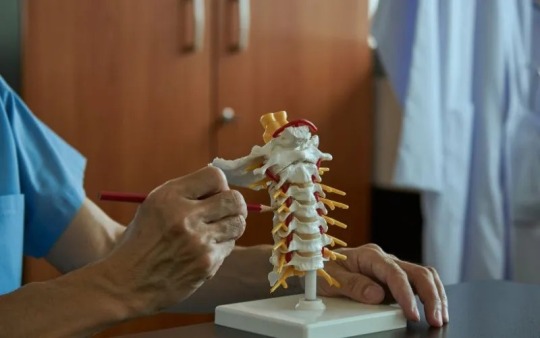
It’s essential for you to know the difference between a neurologist and a neurosurgeon when dealing with medical disorders involving the central nervous system. They both deal with problems that affect the brain and spinal cord which perform most functions of the body. However, their roles differ: a neurologist diagnoses and treats neurological diseases using medicines without surgery and operations while a neurosurgeon in Delhi carries out the surgery to deal with brain and spinal cord disorders.
What is a Neurologist?
Neurologists treat brain and nervous system conditions. They diagnose and treat them using non-invasive approaches. They are the first expert someone visits if they are facing brain or spinal cord issues. Neurologists can treat several conditions, including
Neurological disorders: epilepsy, multiple sclerosis, Parkinson’s disease, Alzheimer’s disease, and forms of dementia.
Neuromuscular disorders: Muscular dystrophy, myasthenia gravis, peripheral neuropathy and other diseases.
Headaches and migraines: Management of terminal and chronic stages.
Stroke: Eliminating both ischemic (clot-promoting) and hemorrhagic (bleeding-causing) kinds.
Movement disorders: Tremor, dystonia and restless leg syndrome.
Seizure disorders: These include epilepsy and several other types of seizures.
Neurodevelopment disorders: These include autism and Attention-Deficit — Hyperactivity Disorder (ADHD).
Neurological injuries: These refer to traumatic brain injury or spinal cord injury.
Neurologists use a variety of diagnostic tests and methods. Some of these diagnostic tests are MRI, CT scans, EEGs, EMGs, regular neurological exams, and nerve conduction studies. They work with other physicians and specialists to ensure the best care for neurological condition. Read more
0 notes
Text
Umm this is a gender war deep cut but I was on Wikipedia looking at old, rejected studies about Gender and went down a rabbit hole that led me to this:

This guy was a respected figure in psychology but has no real expertise on trans issues or gender dysphoria. Now he constantly makes himself available as an "expert" witness to Republicans and right wing governments to support anti trans laws.
And it turns out he is banned on wikipedia for using sock puppets to try to push his views in gender related pages 😅
Imagine being respected for your neurological studies on pdffiles, having a teaching position at the top university in your country, featuring in the media and successful documentaries...
And being so terminally online that had to write a failed ban appeal insisting it wasn't your sockpuppet accounts, just a close friend who talks the same...

Scratch a transphobe and no one bleeds bcause they're terminally online.
#anti-trans idiots#trans rights#James Cantor is banned on wikipedia#JKR archetype#Beta male version of Jordan Peterson
14 notes
·
View notes
Text
Five Frontline Canaries Who Fought for Lives, Truth, and Medical Freedom
In the gripping series Canary in a Covid World, five extraordinary doctors emerge as heroes who stood on the frontlines during the pandemic, saving lives and advocating for truth when it was most needed. Dr. Peter McCullough, Dr. George Fareed, Dr. Mary Talley Bowden, Dr. Pierre Kory, and Dr. Paul Marik represent the courage, expertise, and unwavering dedication that define the true spirit of medicine. Their stories, featured across Canary in a Covid World: How Censorship and Propaganda Changed Our (My) World (Vol. 1) and newly released Vol. 2 Canary in a (Post) Covid World: Money, Fear, and Power, illuminate the power of early treatment and the failures of institutionalized health policy.
Dr. Peter McCullough
Featured in Chapter 15 of Vol. 1 and Chapter 14 of Vol. 2, Dr. McCullough, a leading cardiologist and epidemiologist, spearheaded the development of the first outpatient treatment protocol for COVID-19, drastically reducing hospitalizations and fatalities. He worked tirelessly to bring proactive, patient-centered care into focus, even as health authorities actively suppressed his methods.
In Volume 2, Dr. McCullough delves deeper into the rise of vaccine-related injuries, exposing alarming trends such as myocarditis, blood clots, and neurological damage linked to COVID-19 vaccines. He joins a growing group of medical experts calling for the immediate suspension of mass vaccination programs. Additionally, his work on vaccine detox protocols, which includes dietary changes, supplements, and therapeutic interventions, offers hope to those suffering from long-term side effects. His chapters are both a searing indictment of institutional failures and a roadmap for ethical medicine.
11 notes
·
View notes
Text
Lol it's funny how the same type of people who go "therians are biologically human! There are no physical therians, holotheres or p-shifters!" also suddenly balk at phantom limbs being called hallucinations
If you claim to be physically, genetically, 100% human you are claiming nothing about your physical body is a nonhuman creature, right? If that is the case, you have never had a nonhuman body part. You would not have the neurological underpinnings or any innate neurological activity associated with a "tail" or "wings" the way a human amputee would. (To be clear, you'd still have neurological activity, but it's not like you've had a tail and been using it for years before it got chopped off. There will be differences.) You would be feeling a tactile hallucination.
This is supported by evidence by scientists - when they induce phantom limbs in people it's considered more of a tactile hallucination. When tulpamancers learn how to impose phantom limbs - imposition is already considered hallucinating. Furries can also do this too, apparently. Researchers talking about otherkin have already mentioned that many people hallucinate, but only a few ever qualify for the diagnosis of schizophrenia. And you can have benign hallucinations.
To quote Dr. Jan Dirk Blom (an expert in clinical lycanthropy):
In his opinion, the otherkin experience of "phantom shifts" may not be as unusual as it sounds: "In my area of expertise, i.e., psychotic disorders, it is well-known that some 10–15 percent of all people in the general population experience auditory hallucinations, and that close to a full 100 percent experience some sort of hallucination during their lives (i.e., auditory, visual, olfactory, or otherwise), but that only 1 percent are diagnosed as suffering from schizophrenia spectrum disorder."
If you're human, then why not embrace the way the human mind works? It shouldn't be an issue to acknowledge this.
9 notes
·
View notes
Photo
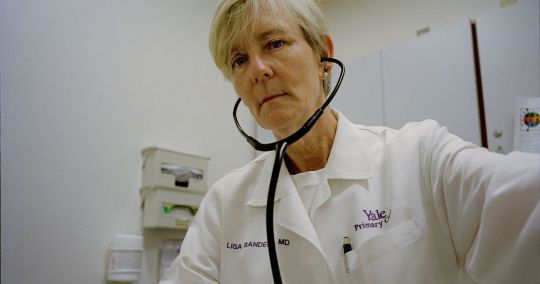
At Yale’s Long COVID Clinic, Lisa Sanders Is Trying It All
excerpts:
Since the beginning of the pandemic, she — together with colleagues in the pulmonary and neurology departments — had been seeing long-COVID patients at Yale but often in an ad hoc way. Some of the doctors had become so flooded with people seeking help that they were having difficulty scheduling and treating their regular patients who came to them for everything else ...
Long-COVID patients, generally speaking, have been very miserable for a very long time, and because the illness attacks their brains, their hearts, their lungs, their guts, their joints — sometimes simultaneously, sometimes intermittently, and sometimes in a chain reaction — they bounce from specialist to specialist, none of whom has the bandwidth to hear their whole frustrating ordeal together with the expertise to address all of their complaints: the nonspecific pain, the perpetual exhaustion, the bewildering test results, the one-off treatments. “These are people who have not been able to tell their story to anybody but their spouse and their mom — for years sometimes,” Sanders tells me. “And they are, in some ways, every doctor’s worst nightmare.”
...
Long COVID has been pushing the limits of hospital systems everywhere, not just at Yale. As Americans emerged from the most acute phase of the pandemic, as mask and vaccine mandates lifted and life returned to a semblance of normal for the people who had contracted COVID and recovered, primary-care physicians started to say, “‘I’m not interested in long COVID,’ or ‘I don’t treat long COVID. Let me refer you to a specialist,’” said David Putrino, who runs the new chronic-illness recovery clinic at Mount Sinai. For their part, Putrino added, the specialists were saying, “This is not what my practice is. This is not an emergency anymore.” Patients all over the country reported monthslong waiting times for appointments at long-COVID clinics. All the while, scientists and pundits heaped skepticism on the very notion of long COVID, arguing that infection made people stronger, that new variants posed no threats, that the danger of long COVID was overblown — implying that what patients were suffering from was all in their heads.
Forgotten in this debate are the 65 million people worldwide for whom the pandemic remains a torturous everyday reality.
...
In the late 1990s, patients with a galaxy of unexplained chronic symptoms — including fatigue, sore throat, joint pain, insomnia, dizziness, brain fog, and depression — began to gather into activist and identity groups, calling themselves sufferers of “chronic Lyme.” They had something, they argued, related to a previous infection from the bite of a deer tick, but their doctors were dismissing them as whiners and neurotics. This was in an era when the medical Establishment was rolling its collective eyes at patients who were querying whether diagnoses of “chronic fatigue syndrome” or “fibromyalgia” might fit their symptoms — ones that looked very much like those linked to chronic Lyme.
Sanders joined the chorus of debunkers. These patients had real symptoms and real ailments, she asserted in Every Patient Tells a Story. But the collection of symptoms was “hopelessly broad and overinclusive,” she wrote. “These are some of the most common symptoms of patients presenting to a primary care office.” She concluded that chronic Lyme was a “phantom diagnosis.”
“I completely regret that chapter,” she says now. “I would like to rewrite it.” Sanders explains that she was reacting to the doctors who were preying on suffering people by prescribing interminable courses of antibiotics that were not helping them: “But I completely misunderstood it. The patients were making the connection between their symptoms and Lyme disease.”
...
“We’re not paying enough attention,” she said. “We’re not. Doctors are still dismissing this disease as something that’s in your head. I have seen the exchanges on Twitter: ‘Long COVID is exaggerated, not real.’” Women are diagnosed with long COVID at roughly twice the rate of men, Iwasaki pointed out: “I think if the situation was reversed, we’d pay even more attention to this disease.” - Akiko Iwasaki, immunologist at Yale [also known for her work nasal vaccine & long covid research]
...
But even Sanders was not prepared for how little doctors and scientists know about long COVID. There is no blood test. Health officials can’t even agree on how to define it. The CDC describes long COVID as “signs, symptoms, and conditions that continue or develop after acute COVID-19 infection” — or, in Sanders’s paraphrase, “You got COVID and then something bad happened.” Under the CDC definition, patients have long COVID if they are symptomatic at least four weeks after initial infection. The WHO defines it similarly but with a different time frame: occurring or lasting at least three months after initial infection. This discrepancy matters to Sanders because, as much as possible, she wants to identify patients who have long COVID and not those who may take a little longer to recover from their original illness. In her clinic, she uses the WHO definition.
...
Sanders, more than ever before, is dependent on the patient’s account — on detailed specifics — to establish her diagnosis. It’s a process of elimination and deduction. So she has “learned just to shut the fuck up and listen.”
#covid#long covid#article#medicine#ny mag#yale#re: 'I don't know anyone with long covid'#re: 'JUST get treatment'#lyme#me/cfs#mecfs#fibromyalgia#akiko iwasaki#womens health
94 notes
·
View notes
Text
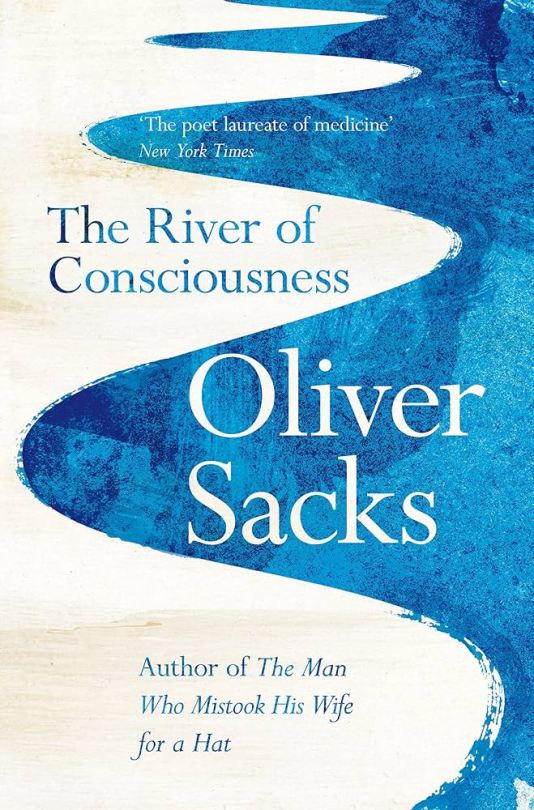
The River of Consciousness by Oliver Sacks
These posthumously published essays range from psychiatry to plagiarism to near-death experiences
One March in the mid 1990s I checked into a hotel in Helsinki. I dropped my bag on the floor and, wondering what Finnish daytime television was like, switched on the TV. A darkened room with a dining table came into focus, and around it were six people having a conversation. To my surprise, all were speaking English, then a face I knew filled the screen – it was Oliver Sacks. Then another, Stephen Jay Gould, and another, Daniel Dennett. I had books by all three. It was snowing outside, and Helsinki seemed suddenly less inviting; I sat down on the bed and began to watch.
A Dutch TV company had assembled these men, together with Freeman Dyson, Stephen Toulmin and Rupert Sheldrake, for the round-table finale of a documentary series on science and the meaning of life. The series, A Glorious Accident, didn’t seem to have invited any women to take part but even so I watched it to the end – three hours later. The participants’ areas of expertise were diverse: biology, physics, palaeontology, neuroscience, philosophy. As the only practising clinician, Sacks made perceptive and valuable contributions – and was clearly having fun.
Sacks died nine years ago in August 30, 2015. A melanoma of the eye, diagnosed nine years earlier, had recurred and metastasised to his liver. The New York Times had referred to Sacks as the “poet laureate of medicine”, and carried an obituary that said that neurological conditions were for him occasions “for eloquent meditations on consciousness and the human condition”. In his last year he put the finishing touches to a memoir (On the Move), and completed some final magazine essays collected soon after his death (Gratitude). In one of his last newspaper pieces he wrote: “I have several other books nearly finished.” We might expect further posthumous essay collections to be on the way.
Millions of Sacks’s books have been printed around the world, and he once spoke of receiving 200 letters a week from admirers. For those thousands of correspondents, The River of Consciousness will feel like a reprieve – we get to spend time again with Sacks the botanist, the historian of science, the marine biologist and, of course, the neurologist. There are 10 essays here, the majority published previously in the New York Review of Books (the collection is dedicated to its late editor Robert Silvers). Their subject matter reflects the agility of Sacks’s enthusiasms, moving from forgetting and neglect in science to Freud’s early work on the neuroanatomy of fish; from the mental lives of plants and invertebrates to the malleability of our perception of speed.
The essay on speed has some characteristic flourishes: of Parkinson’s disease, Sacks writes that “being in a slowed state is like being stuck in a vat of peanut butter, while being in an accelerated state is like being on ice”. He is as good on near-death experiences: “There is an intense sense of immediacy and reality, and a dramatic acceleration of thought and perception and reaction.” Sacks has a Jain-like reverence for insects, and delights in comparative neuroanatomical facts: an octopus may have six times more neurons than a mouse; many plants possess nervous systems that move at a thousandth the speed of our own.
Plagiarism troubled Sacks, and an essay on memory dovetails with one on creativity, examining how someone can copy another’s work through unconscious repatternings of memory. “Memory arises not only from experience,” he concludes, “but from the intercourse of many minds.” He quotes the letters between Mark Twain and Helen Keller on plagiarism, and his own correspondence with Harold Pinter (whose play A Kind of Alaska was inspired by Sacks’s Awakenings). Most of his books are mentioned in passing, and the chosen essays stand as a kind of testament or gazetteer to their range. Reading them, I was reminded of something Annie Dillard said about the essay form: “The essay is, and has been, all over the map. There’s nothing you cannot do with it; no subject matter is forbidden, no structure is proscribed.”
Some of the slighter pieces here suffer from being placed between more substantial work, and in one, only one, Sacks’s argument loses coherence. But even then I was conscious of the great premium he placed on flights of ideas: “If the stream of thought is too fast, it may lose itself, break into a torrent of superficial distractions and tangents, dissolve into a brilliant incoherence, a phantasmagoric, almost dreamlike delirium.”
Sacks was deliriously in love with details – to the irritation of his editors – and he crammed his books with them. When the text couldn’t take any more, he spilled them over to the bottom of the page. It’s in the footnotes that his treasures are often to be found: in a two-page footnote to his essay “Scotoma: Forgetting and Neglect in Science”, Sacks outlines how urgent is the need for reconciliation between psychiatry and neurology, divided now for nearly a century. A “scotoma” is a blind spot in the vision, an area of darkness conjured by irregularities in brain or retinal function:
If one looks at the charts of patients institutionalized in asylums and state hospitals in the 1920s and 1930s, one finds extremely detailed clinical and phenomenological observations, often embedded in narratives of an almost novelistic richness and density ... this richness and detail and phenomenological openness have disappeared, and one finds instead meagre notes that give no real picture of the patient or his world.
Through the course of the 20th century, the US Diagnostic and Statistical Manual of Mental Disorders (a book conceived to facilitate health insurance billing) has, Sacks insists, impoverished clinical language. “Present-day psychiatric charts in hospitals are almost completely devoid of the depth and density of information one finds in the older charts, and will be of little use in helping us to bring about the synthesis of neuroscience with psychiatric knowledge that we so need.” Earlier in the book he singled out one of the defining moments of that schism, when in 1893 Freud gave up looking for elements of brain pathology that might be relevant to mental health: “The lesion in hysterical paralyses must be completely independent of the nervous system,” Freud wrote, “since in its paralyses and other manifestations hysteria behaves as though anatomy did not exist or as though it had no knowledge of it.”
Daily inspiration. Discover more photos at Just for Books…?
10 notes
·
View notes
Text
Back when we'd only met three Friends, @ultmateragnarok said that we were 3/3 with them being kind of wild. Well, I think with this, we're officially 5/5, and I know why this Friend was security!Friend's mission partner. And that's all I'm gonna say in this blurb. :P
Chapter 11: Expertise
After the Friend had gotten its bearings and assured me that the bot pilot was functioning correctly and in 13 system-days we would emerge at Advaita Station as planned, it did not ask any more questions. It just asked to copy my Friend's data stick, which I allowed, and quietly settled in its bed to work on the Encephalon data, submitting to my treatments when necessary with no complaint.
(It was uncanny and more than a little pathetic how much comfort I derived from its largely silent presence.)
As for me, I kept myself busy attending to the Encephalon patient, and also working on the Encephalon data. When I managed to distract myself from what exactly it was that I was looking at, it was some of the most convoluted neurology that I had ever seen--I found myself wishing I had Ratthi's help again, even though soliciting him was arguably part of what had gotten me into this mess. (Nor did I truly want to think about Ratthi right now. It was a melancholy affair at the best of times, and I knew myself well enough to know that right now I'd just spiral into being fruitlessly angry at him for walking out of the damned hostage situation with a laugh and a smile.)
I had just been poring over a particularly difficult log that Ghostwheel had managed to retrieve while my Friend visited the lion's den, when the Friend poked its head out of the medbay.
"Doctor Mrinal? Could this Friend perhaps draw on your expertise? The data is… Baffling, to say the least."
"If you think I'm doing any better on it, you'd be wrong," I said tiredly. "But sure. Get back to bed, I'll come to you once I find a portable terminal screen."
The Friend gave me a baffled look.
"If your feed interface was damaged in the evacuation, this Friend can take a look. It has the basics."
There was no way I was putting that back on.
"What does this Friend not have the basics of?" I said instead. "Infiltration, piloting, neurology, and now feed technology?"
Surprisingly, the Friend grimaced. "And none of those skills are great. This life teaches a diverse set of skills by necessity. As a tradeoff, there is often very little opportunity to stay at the top of one's old field. Which this Friend is very much feeling right now."
Well, I was feeling the lack of an expansive skillset, so I wasn't particularly sympathetic.
"So you're a neurologist."
The Friend waved a hand dismissively. "Trained as one some time ago. Which was why it had been selected for this mission. But this is far beyond its expertise."
"As is staying in bed when ordered?" I narrowed my eyes at it, and it grinned and disappeared.
There was nothing like a portable terminal in the barely-outfitted shuttle--and why would there be, when its owners were heavily augmented?--so I sighed and went over to the Friend, feed interface electrodes burning a hole through my pocket.
"Nothing. So kindly just describe the problem you had."
"That might be difficult. Is there really no way to get you back into the feed? Then we should head over to the main terminal."
"One of the last things your own colleague told me not to wear the interface again, no matter what. Considering both of the Friends and the hacker seemed to have been attacked through it, I'm inclined to follow its instructions."
"Oh." The Friend inclined its head, eyeing me silently, then said, "Doctor, this Friend will once again request an account of what happened at Minerva. It understands the difficulty involved, but… Please. It can't make heads nor tails of the situation like this, and frankly, it's terrifying."
"You feel fear?"
The Friend scoffed.
"Of course this Friend feels fear. And regret. And pain. And also joy, and excitement, and all the other things one needs to function in this world. The human brain is a complex system. We only modify what we truly need to in order to fulfill our mission."
My Friend's explanations floated into my mind, unbidden. What this one was saying was true, but… "Individualism, social attachments, your sense of belonging to groups. You cannot honestly say those are minimal modifications."
"No, but they are necessary. The charge of our movement is to be friend to all, save those who wish harm on others. Not to some, as chosen by arbitrary criteria or reflexive attachment." It smirked. "As you can imagine, this does not always make us a welcome presence."
"And not the absolutely terrifying modifications which put you into the same class of monstrosity as chemically-enhanced assassins or government module-controlled constructs, of course," I said dryly.
The Friend gave me an amused glance. "You must think more pragmatically, Dr. Mrinal. Most people are fine with monsters, you see, so long as they can control them. But the primary function of our augmentations is to protect us from such measures. We do not allow loyalty, whether natural or artificially-induced, to get in the way of what's right, no matter how difficult the circumstances, and that is what makes us threat and target both. But doctor? I can see you are still avoiding the subject."
"You are infuriating," I told it, and it flashed me a knowing grin. "Fine. I'll tell you, but there's not much to tell. We hadn't even returned to Encephalon for further investigation as the Friend who brought you in had wanted. Someone from Encephalon--probably some sort of feedhound--discovered us while we were trying to evacuate our patient and their family. They first attacked my doctor Friend, then the hacker, and dispatched them very quickly. Your Friend told me to remove my interface and went off to try and rescue my doctor Friend. Then everyone who was still on the station was lost and the shuttle launched with only the three of us on board."
"That dovetails nicely with what I could gather from the shuttle logs. But it's unlikely that this Friend's mission partner went off to rescue your colleague," the Friend said blithely.
"What?"
The Friend waved its copy of the data stick in the air. "According to the briefing we got, the Friend in charge of this station wasn't very feed-proficient. If the attack was as rapid as you described, it probably didn't have time to purge its own memory. So this Friend's partner must have tried to remedy that. Its first goal must have been to erase the dangerous data and then maybe try to evade capture and act on its own. It probably wasn't planning to return regardless of what happened. With any luck, it'll be in hiding and waiting for backup on Minerva once the Friends mount a second effort."
The iridescent rage which had been my saving grace and my downfall both flared in me again.
"If it hurt my friend for some sort of damned strategic goal, I--"
"Please," the Friend said sharply, rolling its eyes. "You realize that goal includes your identity, Dr. Mrinal? Did you want to emerge from the wormhole only to immediately be hunted down for terrorism because of your proven links to our organisation? Besides, Zaharije itself must have been preparing for the eventuality. Otherwise it would not have entrusted you with the backup to both of their memories in advance."
"Zaha--the Friend… My friend did what?" I said stupidly.
"You can use the call signs if necessary to avoid confusion, you know. It's not offensive, we literally choose them for our operations. Just don't do it any more than strictly necessary, and you're good. Anyway, the two big files? Normally, they're keyed to the specific Friends who created them, but under certain conditions other Friends can read them. They're not used outside of exceptional circumstances, though, because it's a huge risk if they fall into the wrong hands. Usually we just erase incriminating data with no backup and relearn as necessary. But neither of the active Friends would have had time to process their most recent Encephalon memories into something more secure, so here we are, sitting on two giant lumps of critical memory data instead. Well, four lumps, considering that both of us have backups now."
I sat down heavily in a neighboring chair, feeling dizzy, and stared down at the beaten-up metal floor. My Friend no longer remembered me?.. I had both its and Luca's memory in storage? This was too much.
"Why are you telling me all this?" I said finally.
"Eh," the Friend shrugged. "A member of our organization trusted you with the fucking Lyson procedure. What this Friend just gave you is usually classified as less sensitive information, because memory manipulation tech isn't unknown in the Rim. And it figured you have a need to know, considering our second priority."
"Second priority?"
"As this Friend already mentioned, the first one is obviously getting the Encephalon patient to a safe place where they can be cared for. But the second one? This Friend is planning to go back to Minerva and finish its mission. And it thinks you probably want to tag along?"
I raised my head to stare at its stupid cheerful face in utter disbelief.
"Me."
"Yeah, you."
"Me."
"Do you see anyone else in this shuttle? Well, except the immobile patient?"
"You're insane."
"Insufferable, infuriating, insane--any more nice in-words you want to call this Friend before you and it get down to planning? Or, well, before you tell it that it misread you. But it thinks someone who knows the lay of the land would be pretty useful for the next Minerva attempt, even if they decided to mostly stay behind on mission control or something. Seriously, Dr. Mrinal, you'd be an asset. Please consider the option."
Consider the option? By the stars, how was I supposed to do that when faced with such exemplary brazen idiocy?
Besides, I was given no time to recover my critical faculties. Because the shuttle's old speakers cracked to life, and a familiar, and no less incensed, voice hissed, "Well, if the Venusian fly-eater got the doctor's tongue, then I've got a couple of in-words, for you, Friend. Here they are: that's an in-defensibly stupid fucking plan, which will in-evitably get you in-grates fucking in-cinerated."
#the nameless fanfic#ttou#time to orbit unknown#tmbd#horrible crossover thoughts#my writing#Friendly manner of conversation is hell tho#so many “my” and “I” to edit out!
5 notes
·
View notes
Text
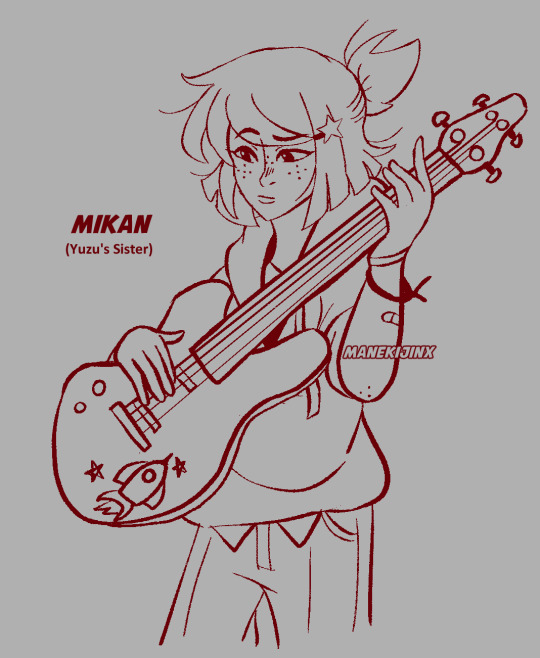
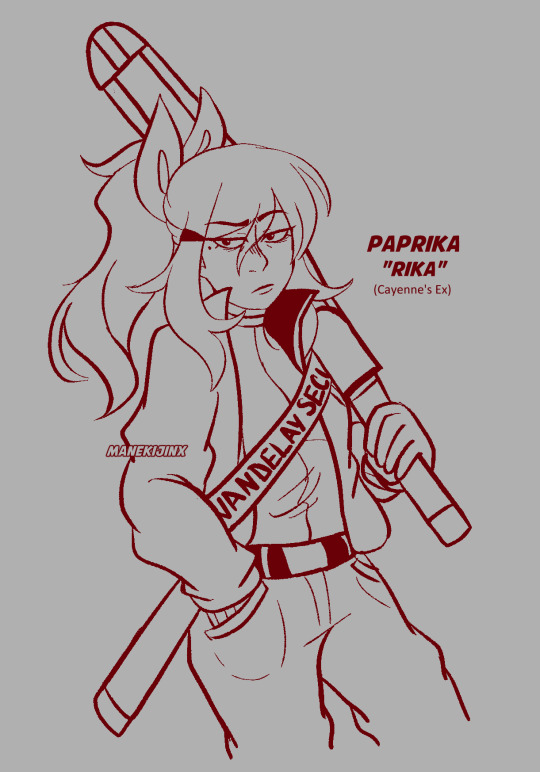
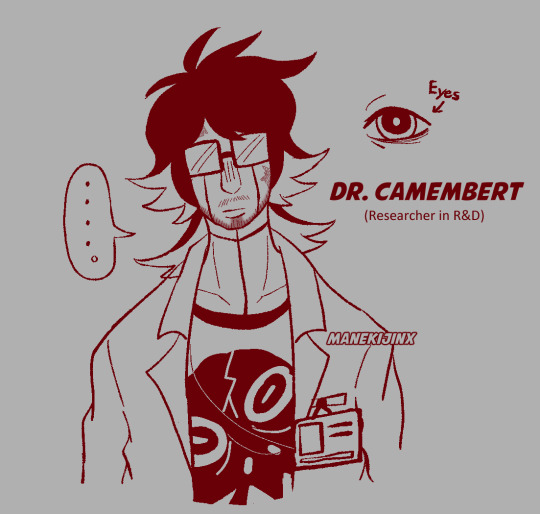
Three more Hi-Fi Rush OCs from a personal project of mine! Introducing Mikan, Paprika, and Dr. Camembert.
More info on these guys below!
Just a bit of lore! These guys are connected to the OCs I posted over here.
Mikan is Yuzu's younger sister! She's 19 and the lead singer/bassist of her indie rock band, Harmonia Rocket (ハルモニアロケト). They had started off with a pretty small following but have had a big boom in popularity in recent years. Yuzu used to play drums for the band before their current drummer joined. ✨
Paprika is Vandelay Security's top unit with prodigy level skill in combat and leadership. She's been recognized by Korsica as her most efficient and competent guard and is often tasked with the jobs that require an expert's attention. She volunteered for Project Armstrong to replace a paralyzed leg and is now capable of the gymnastic level athleticism she formerly was in highschool. She and Cayenne volunteered for the project without knowing the other had, making for a very awkward reunion after years of not seeing one another.
Dr. Camembert is one of Vandelay's most brilliant minds. He assists in conducting studies involving robotic implants and neurological technology. However, despite his expertise, he's often kept in his lane by Roxanne Vandelay due to his bizarre interest in the removal of human necessities for the body in favor of achieving "peak efficiency". He was kept under Macaron's watch for most of his time working at Vandelay Technologies, but was left with a bit more leeway when Kale took over the company and replaced Macaron with Zanzo. Nowadays, with Roxanne back at the helm, he's once again kept in check, but now has a body much more cybernetic than she last saw him.
#Hi-Fi Rush#HFR#Hi-Fi Rush OC#HFR OC#Mikan#Paprika#Camembert#My HFR OCs#Hibiki Project#Jinx Draws#I plan to make these guys proper sheets later#But for now! Some quick and easy line sketches#PAPRIKA IS A PERSONAL FAVORITE?? She's really cold and intense but actually a really caring person deep down lol#Mikan's basically the opposite of her brother in every way like while he's lazing about she's super productive with energy#Dr. Camembert... You guys will either love him or hate him lol#I almost hope hate for some of the things I have planned for him 😭
19 notes
·
View notes